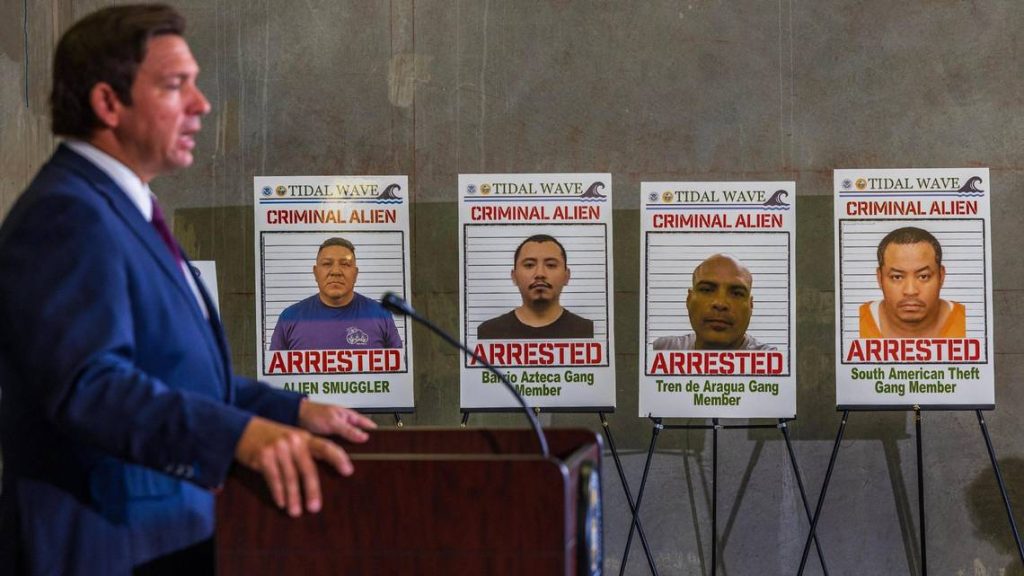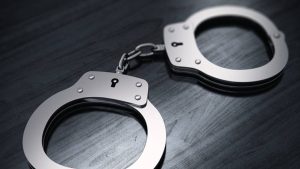By Claire Healy and Ana Ceballos Updated May 1, 2025 3:13 PM
A six-day immigration sweep in Florida last week resulted in the arrest of 1,120 people across the state, an operation that state and federal officials described as the largest of its kind to date and a “warm up” for future immigration enforcement operations.
“We believe this is just the beginning,” Gov. Ron DeSantis said at a news conference Thursday in Miramar. “The best is yet to come.”
The Trump administration only released the names of 10 individuals, citing a policy of not disclosing private identifying information. But U.S. Immigration and Customs Enforcement officials said that 63% had a criminal record, and the rest all have final orders of removal. The immigrants are primarily from Guatemala, Mexico, Honduras, Venezuela and El Salvador.
The large-scale so-called Operation Tidal Wave — first reported by the Miami Herald – is a glimpse of the type of aggressive policing partnerships that could soon start to ramp up in Florida, a state where roughly one-fifth of the population is foreign-born. It is part of a mass deportation campaign led by President Donald Trump, and officials said the operation could soon be replicated across the country.
“I think the governor would agree that this will not be the last one here in the state of Florida, but also a model that we’re able to take to other states,” Madison D. Sheahan, the deputy director of U.S. Immigration and Customs Enforcement.
Dozens of local, state and federal agencies participated – including over 250 members of local and state law enforcement and the National Guard, officials said. The arrests were done in coordination with local and state agencies that have entered into formal agreements known as 287(g) to help federal authorities with immigration enforcement.
“While this may be the first 287g operation of its kind, thanks to the governor, it’s not going to be the last,” Sheahan said. “We will not stop until our American families and everyday Americans are safe in their own communities, because we have zero tolerance for criminal illegal aliens.”
According to a copy of the plans reviewed by the Herald, federal authorities initially targeted 800 “criminal individuals or immigration violators” with final deportation orders in Miami-Dade and Broward counties and the cities of Tampa, Orlando, Jacksonville, Stuart, Tallahassee and Fort Myers. But the figures shared by federal officials on Thursday indicate the number of arrests went beyond the initial goal.
The plans said federal authorities identified individuals through “an organized, methodical, investigative approach,” and that “teams would continuously evaluate” the information to determine what enforcement action would be taken during the sweeps.
“The state leaned in on it, and those numbers are wonderful, and they’re great,” State Board of Immigration Enforcement Executive Director Larry Keefe said. “But our first op, so to speak, it’s a warm up, it’s a test run, it was just to kind of see how things played out after all those months of working and planning.”
Amid reports that a U.S. citizen was detained on Apr. 16 by Florida Highway Patrol under a new Florida law targeting undocumented immigrants, activists and lawyers have expressed concern about the operation. Bacardi Jackson, the executive director of the American Civil Liberties Union in Florida, raised concerns about the lack of information about each individual arrested in the campaign.
“We are deeply concerned about the civil rights and liberties of Floridians – including United States citizens – being violated in this campaign to harm immigrants,” she said in an emailed statement to the Herald. “The Trump administration’s mass deportation agenda, anti-immigrant Florida laws, and ICE collaboration at the local level, have unleashed a fog of fear and chaos into our communities.”
Juan Cuba is the executive director of Sheriff Accountability Action, a nonprofit that aims at ensuring accountability in sheriff’s departments across the country. He said that the collaboration between local law enforcement and ICE will make communities less safe by discouraging victims from coming forward to police. DeSantis told reporters at the press conference that the 287g program would not interfere with daily law enforcement activities.
“Operation Tidal Wave only made it harder for local law enforcement to do their jobs by stoking fear in the community,” Cuba said, “which will result in less people calling 911 for help or reporting crimes.”
More details on the arrests At the press conference Thursday, officials answered questions in front of a graph of arrests by nationality, and mugshots of four men. “Alien Smuggler,” read the description of one man. Another read: “South American Theft Gang Member.” ICE officials also distributed a handout to reporters in which six individuals represented the “most egregious examples” of the types of criminals who were arrested last week. Sheahan said one man was arrested for kidnapping; another for murder. Over 430 of the people arrested were from Guatemala; 280 from Mexico; 153 from Honduras; 48 from Venezuela; 24 from El Salvador; and 178 “from elsewhere,” according to the handout. Officials said that no minors were arrested, and no known children had been transferred to the Florida Department of Children and Families. “Those arrested who have final orders of removal or returned to the United States illegally after being deported are subject to immediate removal from the country,” according to the handout. “The remaining aliens are in ICE custody awaiting due process before an immigration judge or pending travel arrangements for removal.” At the press conference, DeSantis said the state will continue to help the Trump administration in immigration sweeps across Florida, where the governor said “tens of thousands” of undocumented immigrants are facing final deportation orders. The governor also reiterated that he wants to set up temporary housing for detained immigrants, but is waiting approval from the Department of Homeland Security. “That could potentially be a short-term support for the lack of space that the feds may have so we stand ready, willing and able to help in that space,” the governor said. Miami Herald staff writer Julie K. Brown contributed to this report. This story was produced with financial support from the Esserman Family Foundation in partnership with Journalism Funding Partners. The Miami Herald maintains full editorial control of this work. This story was originally published May 1, 2025 at 1:28 PM.




